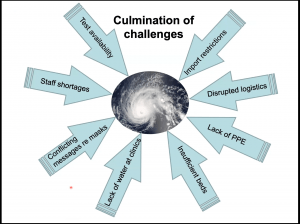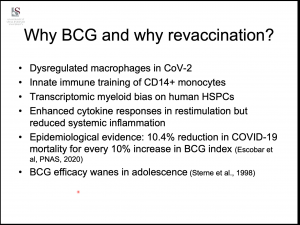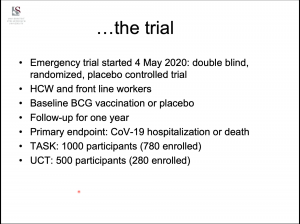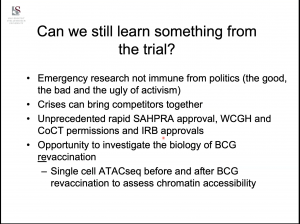This webinar, co-hosted by South African Immunology Society (SAIS) and Immunopaedia featured talks by Prof Christine Benn on “BCG for COVID-19 – hope or hype?” & Prof Gerhard Walz on “BCG trials for COVID-19 in SA – progress and promise.”
Studies have shown that in addition to BCG providing protection against Tuberculosis in children, it also have non-specific effects which are associated with a reduction in all-cause infant mortality* (Kristensen et al., 2020) and reduction in upper respiratory tract infections in revaccinated individuals (Nemes et al., 2019; Wardhana et al., 2020). These non-specific responses have been attributed to trained immunity# (Read more: Have you heard of trained immunity?) which are induced upon vaccination and contribute to a decrease in systemic inflammation.
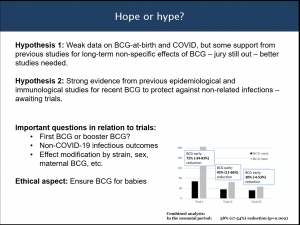 Prof Christine explained two main hypotheses around BCG & COVID-19: (1) BCG-at-birth protects against COVID-19 & Recent BCG protects against COVID-10. Currently, no direct evidence for either is available, however, a plethora of ecological studies have suggested that the first hypothesis is responsible for low COVID-19 prevalence in some countries (Read: BCG & COVID-19). Realistically, this may not be possible because trained immunity is short lived < 2 years, suggesting that it may not be the sole reason for reduced burden in countries where BCG is still give. For hypothesis 2, trials are currently investigating are on-going, in the meantime observation studies provide evidence that recent BCG vaccination is associated with lower the risk of COVID-19 (Moorlag et al., 2020; Amirlak et al., Pre-print)
Prof Christine explained two main hypotheses around BCG & COVID-19: (1) BCG-at-birth protects against COVID-19 & Recent BCG protects against COVID-10. Currently, no direct evidence for either is available, however, a plethora of ecological studies have suggested that the first hypothesis is responsible for low COVID-19 prevalence in some countries (Read: BCG & COVID-19). Realistically, this may not be possible because trained immunity is short lived < 2 years, suggesting that it may not be the sole reason for reduced burden in countries where BCG is still give. For hypothesis 2, trials are currently investigating are on-going, in the meantime observation studies provide evidence that recent BCG vaccination is associated with lower the risk of COVID-19 (Moorlag et al., 2020; Amirlak et al., Pre-print)
Prof Gerhard Walzl then presented his talk on “BCG trials for COVID-19 in SA: progress and promise”. He highlighted challenges the SA healthcare system expriences which include high burden of TB, HIV and more recently non-communicable diseases like diabetes, and also inadequate intensive care facilities among others see below. He then described why BCG re-vaccination was “trailed”, and some challenges they experienced which included: funding challenges “poor buy in from govt”, PPE shortages, lockdown etc.
Notes:
- *: this is not only associated with BCG but also other live-attenuated vaccines such measles and polio
- #: Trained immunity is the non-specific resistance to infection that is conferred by innate immune cells. Mechanistic studies have attributed trained immunity to epigenetic re-programming that occurs when innate immune cells are activated by infection or vaccination (Netea et al., 2016).
Summary by Cheleka Mpande






